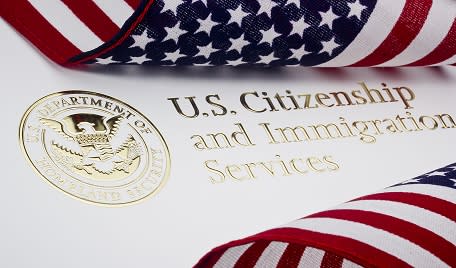Federal judge ponders broader limit for Trump immigration order
A Maryland federal judge who last week blocked one key part of President Trump’s new immigration restrictions will talk with lawyers on Tuesday about broadening that bar to enforcement. At the telephone conference, lawyers for two refugee rights groups will ask the judge to go even further.

U.S. District Judge Theodore D. Chuang of Greenbelt, MD, acted on his own in sctting up the afternoon discussion to consider stopping the government from reducing by more than half the number of foreign refugees who will be allowed to enter the U.S. this year.
A federal law, the Refugee Act of 1980, gives the president the authority — after consulting with Congress — to set a total number for refugees who will be allowed to resettle in the U.S. during a fiscal year. Last September, President Obama put the number at 110,000, between last September 30 and October 1 this year.
Soon after President Trump took office in January, he issued his first executive order to curb immigration, opting on his own to reduce that total to 50,000. Allowing any more than that, the order said, would be “detrimental to U.S. interests.” He repeated that refugee ceiling this month in issuing a revised version of the executive order.
The new ceiling was part of a longer list of provisions dealing with refugee policy, including a 120-day suspension of entry of any refugees, from any nation. Those provisions are separate from the provision that suspended for 90 days the entry of any foreign nationals from a specific list of Mideast nations.
Last week, when Judge Chuang ruled on challenges by two groups that work for refugee resettlement in the U.S., he blocked only the restrictions on entry from six listed nations with Muslim majorities, declaring that those are likely to violate the Constitution as a form of discrimination against Islam. He ruled that the challengers had not made their case against the refugee restrictions.
The Trump Administration has appealed the enforcement bar on the restrictions from the Mideast nations, but has not yet asked the U.S. Court of Appeals to put the judge’s order on hold during the government appeal.
On Monday, Judge Chuang moved to reopen the issue of whether to block the reduction of the refugee admissions ceiling. His brief order indicated that one reason for doing so was that a federal judge in Hawaii had blocked all of the refugee restrictions as part of a broader ruling.
So, Judge Chuang summoned lawyers to the Tuesday afternoon telephone conference to discuss whether he now has the legal authority to take action on the refugee admissions ceiling.
The two refugee groups apparently had already planned to seek further action, because within minutes of the judge’s call for the status conference, they filed a letter asking permission to file a fresh challenge, not only on the refugee admissions ceiling issue, but on all of the executive order’s restrictions regarding refugees.
Their letter argued that the judge could consider the new request, even though the government has appealed the judge’s narrower enforcement bar, because the issues are separate from each other.
They will argue, they told the judge, that all of the refugee restrictions represent discrimination against Muslims. They said that government lawyers will react to the proposal at the Tuesday session.
Legendary journalist Lyle Denniston is Constitution Daily’s Supreme Court correspondent. Denniston has written for us as a contributor since June 2011 and has covered the Supreme Court since 1958. His work also appears on lyldenlawnews.com, where this story first appeared.

